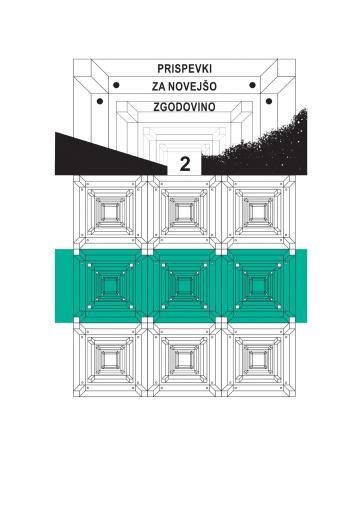/
Periodicals
/
Prispevki za novejšo zgodovino
Influence of Americanisation on the Economic Life in Slovenia with the Emphasis on the Second Half of the 20th Century

Author(s):Jože Prinčič
Co-author(s):Zdenko Čepič (odg. ur.), Damijan Guštin (gl. ur.), Tine Logar (lekt.), Borut Praper (prev.)
Year:2011
Publisher(s):Inštitut za novejšo zgodovino, Ljubljana
Language(s):slovenščina
Type(s) of material:text
Keywords:Slovenija, amerikanizacija,, industrializacija, potrošništvo, John M. Keynes, jedrska elektrarna Krško, Slovenia, Americanisation, industrialisation, consumption, John M. Keynes, the Krško nuclear plant
Rights:

This work by Jože Prinčič is licensed under Creative Commons Attribution-NonCommercial-NoDerivs 4.0 International
Files (1)

Name:Prispevki_za_novejso_zgodovino_2011-2.pdf
Size:4.57MB
Format:application/pdf
Permanent link:https://hdl.handle.net/11686/file9787
Description
The central subject and issue of the author's discussion is an active attitude of the Slovenian
politics and economy towards the process of Americanisation of Slovenia (the transfer of basic
values, relations, rules, organisational forms, and also technology from the United States) after
World War II. Slovenians already faced Americanisation – one of the driving forces of the global
processes – during its beginnings, and have remained in touch with it to this very day. It
involved various processes and was accompanied by rises and falls, sympathy and opposition, as
well as elicited different responses from the political and other elites. During the socialist regime
in Slovenia we cannot discuss Americanisation as a consistent social practice. Nevertheless, the
American influence has constantly been present and increasingly prominent, therefore we can say
Slovenians have entered the modern, technologically developed world through the gates of the
United States. The Americanisation of the Slovenian space has asserted itself after the political changes and attainment of Slovenian independence in 1991, when it became associated with the
ideas of democratisation, modernisation, market economy and consumption.
Metadata (12)
- identifierhttps://hdl.handle.net/11686/20579
- title
- Vpliv amerikanizacije na gospodarsko življenje v Sloveniji s poudarkom na drugi polovici 20. stoletja
- Influence of Americanisation on the Economic Life in Slovenia with the Emphasis on the Second Half of the 20th Century
- creator
- Jože Prinčič
- contributor
- Zdenko Čepič (odg. ur.)
- Damijan Guštin (gl. ur.)
- Tine Logar (lekt.)
- Borut Praper (prev.)
- subject
- Slovenija
- amerikanizacija,
- industrializacija
- potrošništvo
- John M. Keynes
- jedrska elektrarna Krško
- Slovenia
- Americanisation
- industrialisation
- consumption
- John M. Keynes
- the Krško nuclear plant
- description
- Osrednji predmet in problem pričujoče razprave je dejaven odnos slovenske politike in gospodarstva do procesa amerikanizacije po drugi svetovni vojni. Slovenci so se z amerikanizacijo, ki je bila in je še vedno eno od gibal globalnih svetovnih procesov, soočili že v njenem začetku, nato pa obdržali stike z njo vse do današnjih dni. Ti so bili raznovrstni, spremljali so jih vzponi in padci, naklonjenost in nasprotovanja ter različni odzivi politične in drugih elit. V času socialistične družbene ureditve na Slovenskem ne moremo govoriti o amerikanizaciji kot konsistentni družbeni praksi. Kljub temu pa je bil ameriški vpliv vseskozi navzoč in se je stopnjeval, tako da lahko rečemo, da so Slovenci v sodobni, razviti svet vstopali skozi ameriška vrata. Amerikanizacija slovenskega prostora je prišla do veljave po političnih spremembah in slovenski osamosvojitvi leta 1991, ko se je lahko povezala z idejami demokratizacije, modernizacije, tržnega gospodarstva in potrošništva.
- The central subject and issue of the author's discussion is an active attitude of the Slovenian politics and economy towards the process of Americanisation of Slovenia (the transfer of basic values, relations, rules, organisational forms, and also technology from the United States) after World War II. Slovenians already faced Americanisation – one of the driving forces of the global processes – during its beginnings, and have remained in touch with it to this very day. It involved various processes and was accompanied by rises and falls, sympathy and opposition, as well as elicited different responses from the political and other elites. During the socialist regime in Slovenia we cannot discuss Americanisation as a consistent social practice. Nevertheless, the American influence has constantly been present and increasingly prominent, therefore we can say Slovenians have entered the modern, technologically developed world through the gates of the United States. The Americanisation of the Slovenian space has asserted itself after the political changes and attainment of Slovenian independence in 1991, when it became associated with the ideas of democratisation, modernisation, market economy and consumption.
- publisher
- Inštitut za novejšo zgodovino
- date
- 2011
- type
- besedilo
- language
- Slovenščina
- isPartOf
- rights
- license: ccByNcNd
Citirano v (1)
| Tipologija | Avtor(ji) | Naslov | Kraj | Založba | Leto |
|---|---|---|---|---|---|
| 2.01 Znanstvena monografija | Prinčič, Jože | Pot do slovenske narodnogospodarske suverenosti 1945-1991 | Ljubljana | Inštitut za novejšo zgodovino | 2013 |
Seznam literature v delu (5)
| Stran | Avtor | Naslov | Vir | Kraj | Založba | Leto |
|---|---|---|---|---|---|---|
| 76 | Servan Schreiber, J. J. | Ameriško izzivanje. Ljubljana, 1969 in Svetovni izziv. Zagreb, 1980 | Ljubljana | 1969 | ||
| 76 | Servan Schreiber, J ; J. | Svetovni izziv | Zagreb | 1980 | ||
| 77 | Harm G., Schröter | A compact survey of American economic influence in Europe since the 1880s | Dordrecht | 2005 | ||
| 80 | Himmelreich, Bojan | Pike, špekulanti in Trumanova jajca | Celje | 2008 | ||
| 80 | Prinčič, Jože ; Borak, Neven | Iz reforme v reformo | Ljubljana | 2006 |
